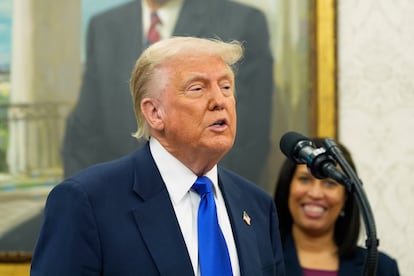Trump shakes up a struggling Hollywood with his tariff threat

Hollywood has new cause for concern. The film industry has been battered by the pandemic, two strikes, and the Los Angeles fires. Now it faces Donald Trump's protectionist policies. The president surprised audiences Sunday night with a proposal seeking to impose 100% tariffs on productions from major studios filmed outside the United States with tax incentives from other nations. The stock markets reflected the reaction to the announcement on Monday. Shares of Netflix, Disney, Warner Bros. Discovery, and Paramount fell between 2 and 3% in the first few hours of trading.
As with every tariff announcement during the Trump era, the details of the threat were not disclosed. "I don't want to hurt the industry, I want to help it because it's been completely crippled (...). I'm going to meet with the industry because I want them to be happy about this. It's all about jobs," Trump said Monday at a press conference in the Oval Office to announce the construction of a new football stadium in Washington.
The White House, however, informed The Hollywood Reporter in a statement on Monday that no "final decisions" have been made and that the administration is exploring "all possible options" to return Hollywood production to the United States.
The message contrasts with the swift response from Howard Lutnick, the banker who was appointed Secretary of Commerce . He stated Sunday night that his office was already working on implementing measures that could impact an industry that employs 2.3 million people and pays $229 billion in wages each year.

The president of the Motion Picture Association (MPA), the industry's voice, recently issued a message during the days in which Trump has placed all economic sectors in his crosshairs. "We maintain a positive trade balance with all major markets, while representing 6% of the national trade surplus in services," said Charles Rivkin, CEO of the MPA. The organization has been arguing for several years that the country needs a federal tax incentive that can compete with a global market where it is easy to find very attractive tax credits abroad.
Trump asserted Sunday night that other countries "have been stealing America's production capacity in recent years (...). Hollywood is making very few movies now," the president said at the foot of the presidential helicopter. "This is a threat to our country," he concluded.
A declining industry in the USThe president's assessment isn't entirely wrong. Hollywood has spent years relocating its biggest productions to countries that offer lucrative tax breaks and lower salaries for audiovisual industry professionals. Production in the country has fallen by 40%, a phenomenon that has recently worsened due to several factors, such as the actors' and writers' strike.
Spending on films with budgets under $40 million has fallen by 25% in the United States over the past two years. These mid-sized films were shot primarily in the United Kingdom, Canada, Hungary, Germany, and the Czech Republic.
The problem is even greater for the studios' big-money projects. Films hoping to make the biggest box office hits of the year are almost entirely made abroad. These range from the film adaptation of the hit video game Minecraft , which premiered a few weeks ago, to the new installments of Mission: Impossible and Jurassic World , which will hit theaters this summer.
Marvel's new Avengers films are being filmed in several European cities. Pre-production on the fifth installment of Avatar, one of the biggest sagas in recent memory, will begin next year in New Zealand—where the previous ones were filmed—with a target release in December 2031.
Variety , the magazine specializing in the film and television industry, reported several concerns among professionals. "How do they plan to determine when the tariffs will go into effect? What will happen to films in pre-production, those being filmed, or those already in post-production? They would be doubling their costs. None of this has been considered," said an unnamed producer from London.
Trump's idea of saving Hollywood is not new. Days before taking office for his second term, he appointed veteran actors Mel Gibson, Jon Voight, and Sylvester Stallone as "special ambassadors" to the industry with the goal of creating a "new golden age of cinema." Gibson, incidentally, plans to begin filming the sequel to The Passion of the Christ, Resurrection , this summer at the legendary Italian studios of Cinecitta, located just outside Rome.
Voight and his agent, Steven Paul, have met with representatives from the guilds to gather information on the state of production in the country, according to Variety . Other industry players, however, maintain that the role of the three ambassadors is symbolic. The founders of Stay in LA , an initiative created by film and television professionals to keep production in Hollywood, knocked on the doors of Trump's envoys seeking help. "They never called us back," those in charge of the organization told the Los Angeles Times . Perhaps the threat of tariffs will get the phones ringing again.
EL PAÍS





